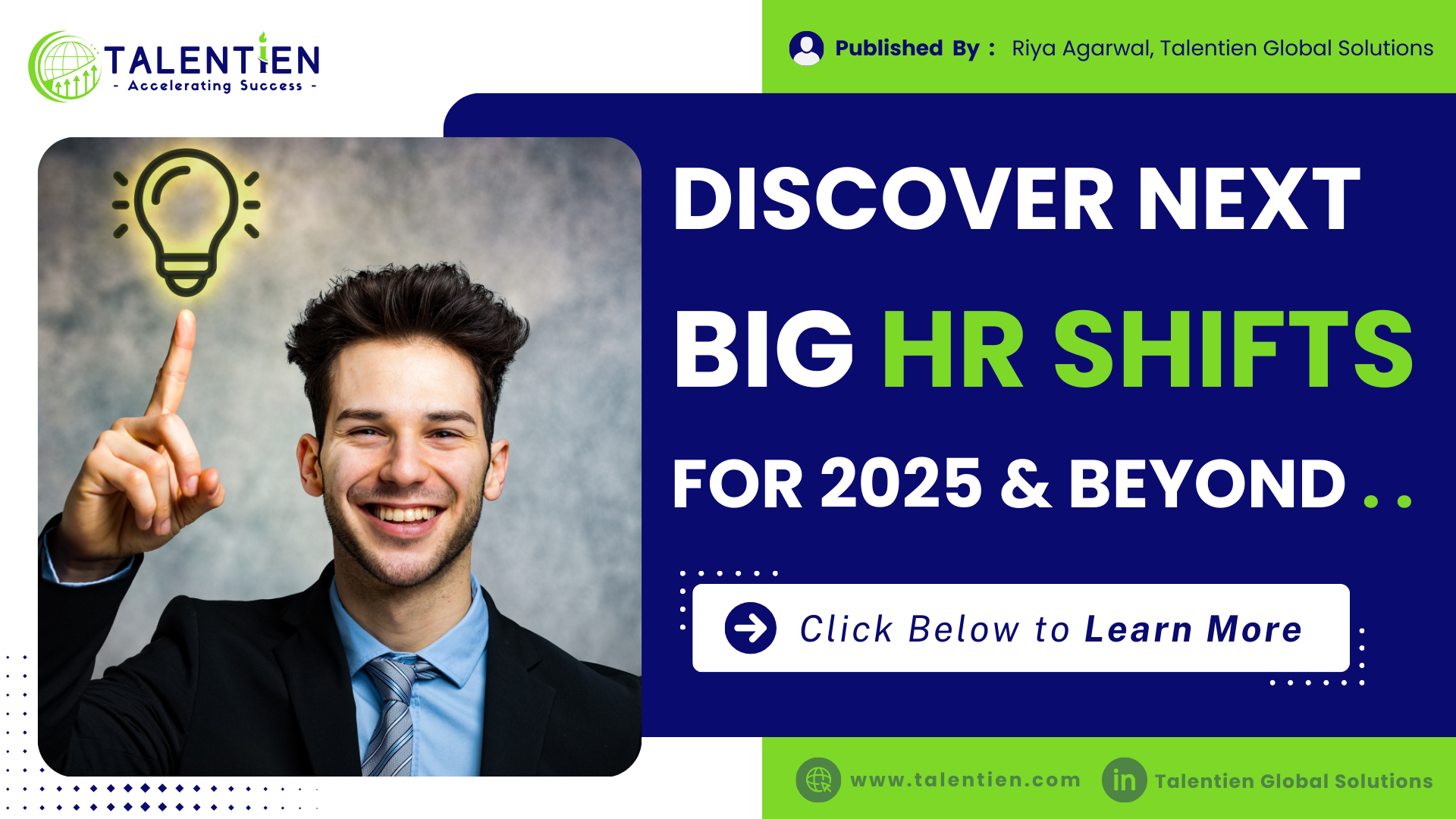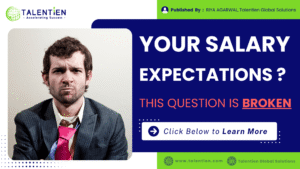The workplace is evolving faster than ever, and HR leaders must stay ahead to build a future-ready workforce.
In 2025, businesses will focus on AI-driven HR, skills-first hiring, employee well-being, and flexible work models.
Companies that adapt to these shifts will attract top talent, improve retention, and drive business success.
Let’s break down the key HR trends in 2025 and what they mean for employers and employees.
Table of Contents
Toggle1. AI-Powered HR : Automation & Smart Decision-Making
Artificial intelligence (AI) in HR is no longer a luxury – it’s a necessity.
In 2025, AI will play a crucial role in recruitment, performance management, and employee engagement.
- AI-driven recruitment: AI will screen resumes, match candidates with job descriptions, and even conduct initial interviews using chatbots. This will help companies hire faster and reduce bias in hiring decisions.
- Performance tracking: AI will provide real-time insights into employee performance, making annual performance reviews outdated. Employees will receive continuous feedback based on AI-driven analytics.
- Predictive analytics: HR teams will use AI to identify flight-risk employees and take proactive steps to improve retention.
Companies investing in HR automation tools will reduce administrative workload, allowing HR teams to focus on strategic tasks like employee experience and company culture.
2. Skills-First Hiring : Moving Beyond Degrees
By 2025, more companies will prioritize skills over degrees.
Traditional job requirements focusing on formal education will be replaced by skills-based hiring.
- Companies will use AI-driven assessments to evaluate candidates’ technical and soft skills rather than relying on resumes.
- Job seekers will showcase their expertise through certifications, project portfolios, and real-world experience instead of just degrees.
- Internal hiring and upskilling programs will help companies fill roles by training existing employees rather than seeking external talent.
This shift will open opportunities for a diverse talent pool, including self-taught professionals, freelancers, and career changers.
3. The Rise of Hybrid & 4-Day Workweeks
Flexible work isn’t going away. In 2025, more companies will adopt hybrid work and 4-day workweeks to improve productivity and work-life balance.
- Hybrid work models will allow employees to split their time between home and the office, ensuring flexibility while maintaining team collaboration.
- Some companies will introduce a 4-day workweek without reducing salaries, aiming to increase employee satisfaction and efficiency.
- Work-from-anywhere policies will become more common, especially for roles that don’t require physical presence.
Companies embracing flexible work will attract top talent, reduce burnout, and improve employee retention.
4. Employee Well-Being & Mental Health as a Priority
The focus on employee well-being will continue to grow in 2025. Companies will invest in programs that support both physical and mental health.
- Mental health support will include therapy sessions, meditation programs, and burnout prevention strategies.
- Financial wellness initiatives will help employees manage personal finances, student loans, and retirement planning.
- Health and wellness benefits like gym memberships, flexible sick leave, and nutrition plans will become standard.
A company that prioritizes employee well-being will see higher engagement, lower absenteeism, and increased loyalty.
5. DEI 2.0: A More Inclusive Workplace
Diversity, equity, and inclusion (DEI) will go beyond policies and quotas in 2025. Companies will take a data-driven approach to ensure real inclusivity.
- Pay transparency laws will push businesses to disclose salaries and close wage gaps.
- AI-powered tools will help eliminate bias in recruitment, promotions, and performance reviews.
- More organizations will introduce neurodiversity hiring programs to support individuals with ADHD, autism, and other cognitive differences.
Companies that genuinely commit to DEI will build stronger, more innovative teams and improve their brand reputation.
6. HR Tech Evolution: Everything on One Platform
HR technology will become more integrated and user-friendly in 2025. Businesses will shift from using multiple tools to all-in-one HR platforms.
- Cloud-based HR software will manage recruitment, payroll, performance tracking, and employee engagement in one place.
- Self-service HR portals will allow employees to request time off, access payslips, and update personal information without HR intervention.
- People analytics tools will help companies make data-driven decisions about hiring, retention, and workforce planning.
Companies that embrace HR tech will streamline processes, reduce errors, and improve employee experience.
7. Gig Economy & Fractional Work on the Rise
The gig economy will continue to reshape the workforce in 2025. More professionals will prefer contract-based work over full-time jobs.
- Businesses will hire freelancers, consultants, and fractional executives for specialized projects instead of maintaining large in-house teams.
- Employees will have multiple income streams, working for several companies simultaneously instead of relying on one employer.
- On-demand hiring will become standard, with companies quickly onboarding professionals for short-term assignments.
To stay competitive, businesses will need to rethink benefits and policies for gig workers, ensuring fair compensation and job security.
8. Learning & Development: AI-Personalized Training
The demand for continuous learning will grow, and companies will use AI to personalize employee training.
- AI-powered learning platforms will recommend courses based on an employee’s role, skills, and career goals.
- Microlearning modules will replace long training sessions, allowing employees to learn in short bursts during work hours.
- Gamified learning experiences will make training more engaging and interactive.
Companies that invest in upskilling will retain employees longer and build a workforce ready for future challenges.
9. Data-Driven HR for Smarter Workforce Planning
HR decisions in 2025 will rely more on real-time data and analytics. Companies will use people analytics to:
- Predict workforce trends, such as attrition risks and talent shortages.
- Optimize workforce productivity by analyzing performance patterns.
- Improve employee engagement using sentiment analysis from surveys and feedback.
HR teams that use data-driven insights will make smarter decisions, reducing hiring costs and improving workforce efficiency.
10. Compliance & HR Regulations: Adapting to New Labor Laws
With the rise of remote work and global hiring, HR compliance will become more complex in 2025. Businesses will need to keep up with:
- Remote work tax laws affecting employees working in different states or countries.
- AI regulations ensuring ethical use of technology in recruitment and performance management.
- Data privacy laws protecting employee information from cybersecurity risks.
HR teams must stay updated on labor laws to avoid legal risks and ensure smooth business operations.
Final Thoughts
The future of HR in 2025 is all about technology, flexibility, and employee well-being. Companies that adopt AI-powered HR tools, prioritize skills-based hiring, and support mental health will build a future-ready workforce. Staying ahead of these HR trends will not only improve recruitment and retention but also create a workplace where employees thrive.
Businesses that fail to evolve will struggle to attract top talent, while those that embrace change will lead the way in building a workforce prepared for the future.
Stay Ahead with TALENTIEN GLOBAL SOLUTIONS!
Embrace AI-driven hiring, flexible work models, and skills-based recruitment with us!
Let’s build a future-ready workforce together!




